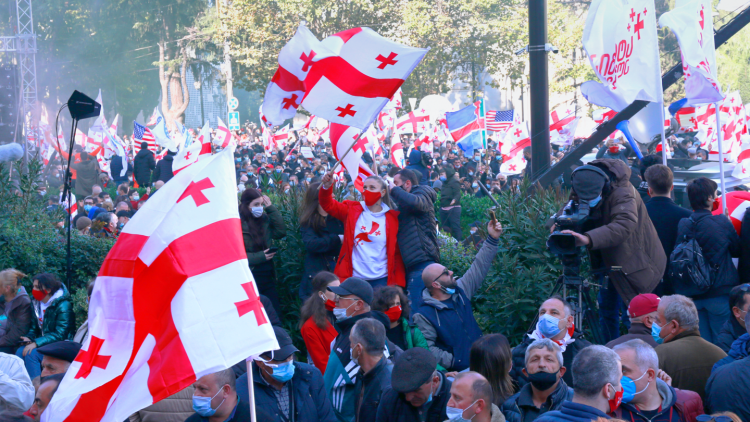
On October 31, 2020, the Parliamentary Elections took place in Georgia, followed by spontaneous protest actions in various parts of the country. The protesters demanded recount of votes due to inconsistencies in many precincts, new elections and resignation of the head of the Central Election Commission (CEC). The protest actions took place in front of Parliament, the CEC building in the capital Tbilisi, as well as various District Election Commissions which heard the complaints regarding the alleged violations.
A large, pre-announced protest rally with tens of thousands of protestors organised by the opposition political parties took place on November 9 in front of the Parliament building in Tbilisi. After the protesters moved to the CEC building in another part of the city, where several monitors of the rights of peaceful assembly observed the entire process of the demonstration. In front of the CEC, the government fired water cannons and gas of unknown type in order to disperse the protesters, without giving them any prior warning. There was no situation of serious public disorder that could justify the use of the water cannons. None of the grounds which justify the use of the water cannon according to UN Human Rights Guidance on Less-Lethal Weapons in Law Enforcement, such as likelihood of loss of life, serious injury or the widespread destruction of property were present at the action.
The Human Rights Center from Georgia published an urgent statement, condemning the unlawful use of the water cannons and gas of unknown type against protesters and called on the government to stop using the disproportionate force.
On November 10, the Government announced nationwide curfew according to which the movement, either by car or on foot, is prohibited from 10 pm – 5 am in Tbilisi and six other cities of Georgia: Kutaisi, Batumi, Rustavi, Zugdidi, Gori and Poti. The government referred to the need of the protection of the public health amid the drastic increase of the cases of new coronavirus as a justification of the new measures. The restrictions were introduced according to the Law on Public Health of Georgia, which was amended in May 2020 and expanded government powers to enact similar bans under “quarantine measures” in times of pandemic or epidemic. The violation of the curfew is deemed administrative offense and results in imposition of high fines against the offender.
Despite the announcement of the curfew, a protest rally involving activists and opposition political parties was held in front of the Parliament building. It should be noted that the people who leave the area of the protest rally, are fined for violating the curfew. The people who stay inside the perimeters of the protest action, are not fined. It may imply that new restrictions do not cover the assemblies and manifestation. However, they do apply to the freedom of movement which is directly connected to the right to assembly and manifestation. The restriction of movement will effectively hinder gathering of people and free exercise of right to assembly and manifestation.
